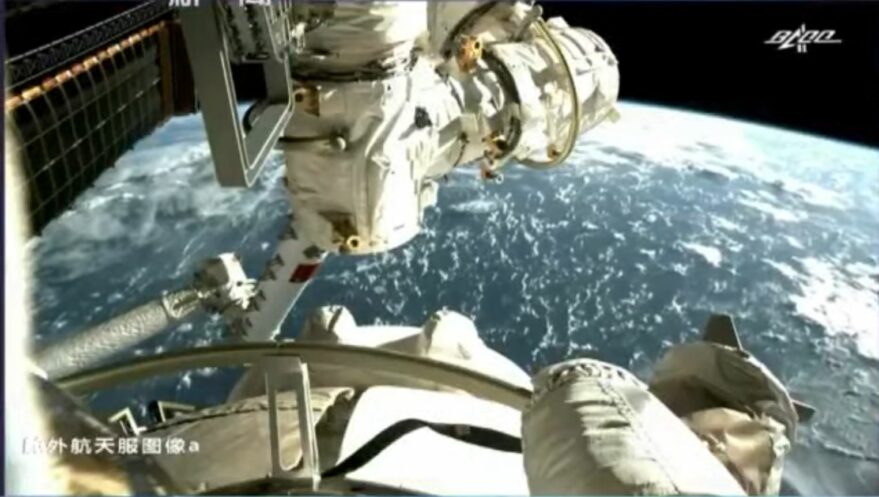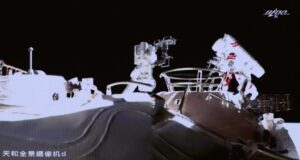Liu Boming opened the hatch of the Tianhe module at 8:11 p.m. Eastern July 3 and was later joined outside by Tang Hongbo. Activities were completed at 2:57 a.m. July 4, according to the China Manned Space Agency (CMSA).
Wearing new-generation Feitian extravehicular activity suits the pair worked outside Tianhe while orbiting around 380 kilometers above the surface of the Earth.
Liu worked attached to a robotic arm while Tang worked along handrails on Tianhe.
The astronauts installed foot restraints and an extravehicular working platform on Tianhe’s mechanical arm. They later raised a panoramic camera.
Shenzhou-12 mission commander Nie Haisheng remained inside Tianhe and operated a small robotic arm to assist his colleagues.
The spacewalk is China’s second, following nearly 13 years after Zhai Zhigang’s 22-minute EVA during the September 2008 Shenzhou-7 mission.
Footage from the Beijing Aerospace Flight Control Center (BACC) broadcast by CCTV showed multiple angles of Tianhe and the astronauts’ point of view. Communications between Tianhe and the ground are facilitated by Tianlian relay satellites in geostationary orbit.
Nie assisted Liu and Tang in testing the Feitian suits July 1 in preparation for the spacewalk. They also checked the Tianhe docking hub which contains an EVA hatch.
A second spacewalk is planned to be conducted during the three-month-long Shenzhou-12 expedition to Tianhe.
Tianhe is the first of three modules which will form a T-shaped space station. The 16.6-meter-long, 4.2-meter-diameter module will provide regenerative life support and the main living quarters for astronauts as well as propulsion to maintain orbital altitude.
Shenzhou-12 docked with Tianhe on June 17, six hours 32 minutes after launch from Jiuquan.
Shenzhou-13 is being readied for an emergency rapid response launch but is otherwise expected to launch on schedule in October. The Tianzhou-3 cargo spacecraft will deliver supplies for the mission to Tianhe a month earlier.
Experiment modules named Wentian and Mengtian are expected to launch in 2022. Each will be manipulated into position by Tianhe’s 10.2-meter-long robotic arm.
Xuntian, a co-orbiting optical, Hubble-class space telescope will launch around 2024. The Chinese space station could also be expanded from three to six modules if main phase construction proceeds as planned.




